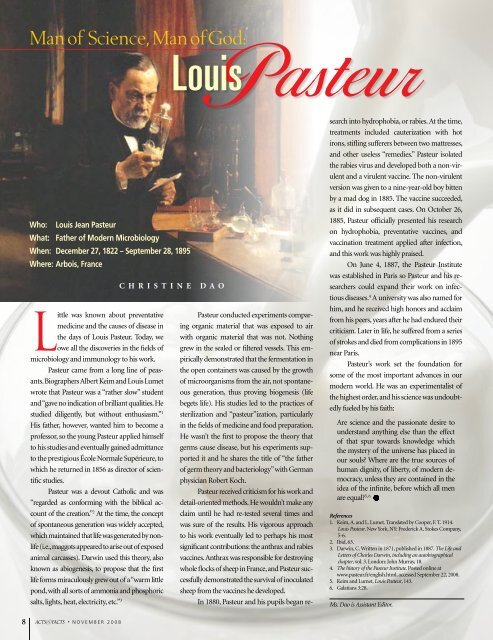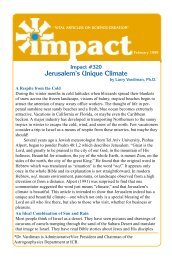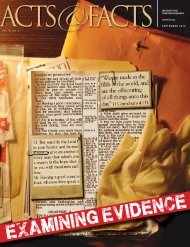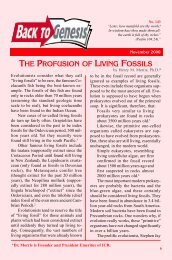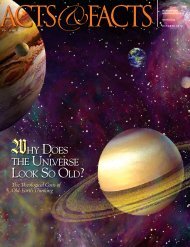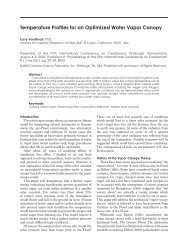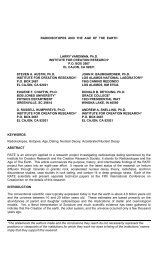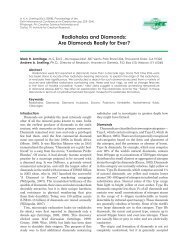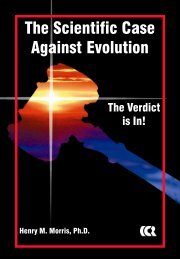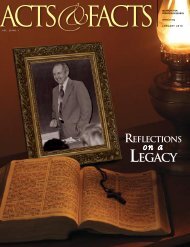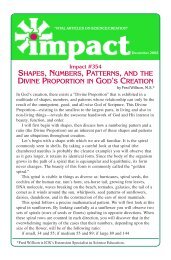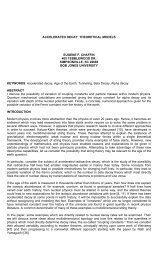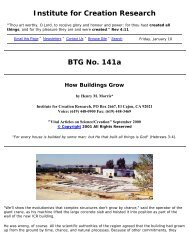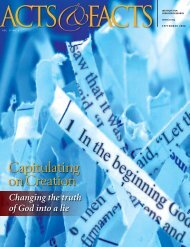Acts & Facts - Institute for Creation Research
Acts & Facts - Institute for Creation Research
Acts & Facts - Institute for Creation Research
Create successful ePaper yourself
Turn your PDF publications into a flip-book with our unique Google optimized e-Paper software.
Man of Science, Man of God:PasteurLouisWho: Louis Jean PasteurWhat: Father of Modern MicrobiologyWhen: December 27, 1822 – September 28, 1895Where: Arbois, FranceLittle was known about preventativemedicine and the causes of disease inthe days of Louis Pasteur. Today, weowe all the discoveries in the fields ofmicrobiology and immunology to his work.Pasteur came from a long line of peasants.Biographers Albert Keim and Louis Lumetwrote that Pasteur was a “rather slow” studentand “gave no indication of brilliant qualities. Hestudied diligently, but without enthusiasm.” 1His father, however, wanted him to become aprofessor, so the young Pasteur applied himselfto his studies and eventually gained admittanceto the prestigious École Normale Supérieure, towhich he returned in 1856 as director of scientificstudies.Pasteur was a devout Catholic and was“regarded as con<strong>for</strong>ming with the biblical accountof the creation.” 2 At the time, the conceptof spontaneous generation was widely accepted,which maintained that life was generated by nonlife(i.e., maggots appeared to arise out of exposedanimal carcasses). Darwin used this theory, alsoknown as abiogenesis, to propose that the firstlife <strong>for</strong>ms miraculously grew out of a “warm littlepond, with all sorts of ammonia and phosphoricsalts, lights, heat, electricity, etc.” 3C H R I S T I N E D A OPasteur conducted experiments comparingorganic material that was exposed to airwith organic material that was not. Nothinggrew in the sealed or filtered vessels. This empiricallydemonstrated that the fermentation inthe open containers was caused by the growthof microorganisms from the air, not spontaneousgeneration, thus proving biogenesis (lifebegets life). His studies led to the practices ofsterilization and “pasteur”ization, particularlyin the fields of medicine and food preparation.He wasn’t the first to propose the theory thatgerms cause disease, but his experiments supportedit and he shares the title of “the fatherof germ theory and bacteriology” with Germanphysician Robert Koch.Pasteur received criticism <strong>for</strong> his work anddetail-oriented methods. He wouldn’t make anyclaim until he had re-tested several times andwas sure of the results. His vigorous approachto his work eventually led to perhaps his mostsignificant contributions: the anthrax and rabiesvaccines. Anthrax was responsible <strong>for</strong> destroyingwhole flocks of sheep in France, and Pasteur successfullydemonstrated the survival of inoculatedsheep from the vaccines he developed.In 1880, Pasteur and his pupils began researchinto hydrophobia, or rabies. At the time,treatments included cauterization with hotirons, stifling sufferers between two mattresses,and other useless “remedies.” Pasteur isolatedthe rabies virus and developed both a non-virulentand a virulent vaccine. The non-virulentversion was given to a nine-year-old boy bittenby a mad dog in 1885. The vaccine succeeded,as it did in subsequent cases. On October 26,1885, Pasteur officially presented his researchon hydrophobia, preventative vaccines, andvaccination treatment applied after infection,and this work was highly praised.On June 4, 1887, the Pasteur <strong>Institute</strong>was established in Paris so Pasteur and his researcherscould expand their work on infectiousdiseases. 4 A university was also named <strong>for</strong>him, and he received high honors and acclaimfrom his peers, years after he had endured theircriticism. Later in life, he suffered from a seriesof strokes and died from complications in 1895near Paris.Pasteur’s work set the foundation <strong>for</strong>some of the most important advances in ourmodern world. He was an experimentalist ofthe highest order, and his science was undoubtedlyfueled by his faith:Are science and the passionate desire tounderstand anything else than the effectof that spur towards knowledge whichthe mystery of the universe has placed inour souls? Where are the true sources ofhuman dignity, of liberty, of modern democracy,unless they are contained in theidea of the infinite, be<strong>for</strong>e which all menare equal? 5, 6References1. Keim, A. and L. Lumet. Translated by Cooper, F. T. 1914.Louis Pasteur. New York, NY: Frederick A. Stokes Company,5-6.2. Ibid, 63.3. Darwin, C. Written in 1871, published in 1887. The Life andLetters of Charles Darwin, including an autobiographicalchapter, vol. 3. London: John Murray, 18.4. The history of the Pasteur <strong>Institute</strong>. Posted online atwww.pasteur.fr/english.html, accessed September 22, 2008.5. Keim and Lumet, Louis Pasteur, 143.6. Galatians 3:28.Ms. Dao is Assistant Editor.8 ACTS&FACTS • NOVEMBER 2008


